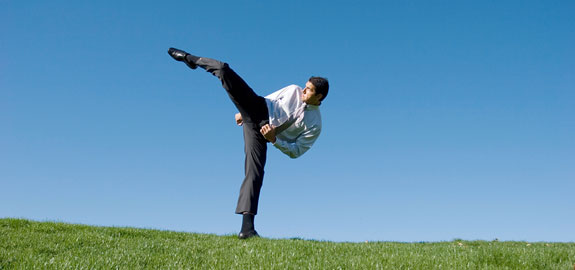 The globalization process has an impact on all of us and almost everything we do. It impacts the environment and consequently the way organizations are structured, and how teams are led, and managed. People work together and embody a variety of personalities, as well as a range of ways of doing things. A modern leader is supposed to grasp all of it to lead forward and to predict behaviors, but never to give or take offence due to misunderstanding the cultural issues.
The globalization process has an impact on all of us and almost everything we do. It impacts the environment and consequently the way organizations are structured, and how teams are led, and managed. People work together and embody a variety of personalities, as well as a range of ways of doing things. A modern leader is supposed to grasp all of it to lead forward and to predict behaviors, but never to give or take offence due to misunderstanding the cultural issues.
Can such old wisdom that is hidden in martial arts philosophy point to the culturally independent way in leadership? Why, precisely, martial arts? Because martial arts does not differentiate! Being taught all over the globe philosophy remains the same regardless of personal belief, skin color, gender, and ability.
Effortless Leadership
In Nature, everything seems to be done effortlessly, or with the smallest effort, the same that is genuinely used in martial arts. Nature, in spite of dealing with extremely huge things and events, conserves “energy” e.g. big tree growth with little “effort,” the seas do not get tired of waving, birds fly with ease, an ant can hold 100 times its weight and appears to carry it effortlessly. The same principle is used in martial arts: in a fight there is simply not enough time to recuperate unwisely spent energy. You tire, you lose.
Overexertion is damaging also in the leadership process: to spend more energy that is needed is often harmful not only because it represents a physical and intellectual hindrance. When things are done effortlessly the impression is that everything runs smoothly and harmoniously, there is no stopping, no fuss, no dissatisfaction. Most importantly, all and everything is achieved without resorting to giving orders or spending time on extensive persuasion. A well led team should not be a battlefield of egos. In teamwork there is no place for individual victories or defeats.
Leadership from Within
“Trust your friends to beat you so that your enemies cannot,” is a saying in martial arts. Trust is the foundation of any martial arts practice. Like a martial artist, a virtuous leader trusts himself first, then trust his people. Consequently, he is trusted by them.
In martial arts, to effectively carry out an activity a very important issue is to be able to integrate all the power and capabilities of your entire organism. For this, coordination of your body and your spirit/mind is needed. A fist fight is like a bull fight. The toreador is not stopping the bull (the opponent) with his body. That is not even possible. The toreador lets the bull pass and then, at the right moment, he slays the bull with his sword. In business, people have their own ideas, concepts, knowledge, etc., and they all like to excel. A well-meaning leader will take advantage of that, and use it to its highest possibilities.
Leadership Foundation: Virtue
While teams involve collaboration, they are nevertheless led only by one person. And that person has to possess a virtue that comes from within. It cannot be taught and learned by way of “formulae” as suggested in many leadership books and MBA schools.
The principles of martial arts can empower one with extreme capabilities that can be used to different ends in different situations. One can cure, immobilize, even kill – with just the right pressure or by hitting certain places on an opponent’s body. It is a person’s virtue (responsibility) as to how one would use this knowledge. Assuming responsibility is, by all means, one of the most demanding requirements in leadership. It translates into a commitment to complete something. Some people like to hide from responsibility for their deeds, actions and decisions. Virtuous leaders never attempt to absolve themselves from their responsibilities, nor do they impose their value system on others. A leadership by virtue embraces people’s interests, knowledge and their abilities.
So yes, Leadership, Virtue, and Martial arts have plenty in common! I’d love to hear your thoughts in the comments section.

